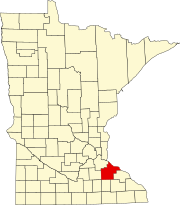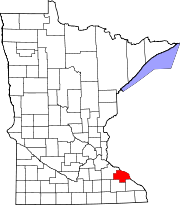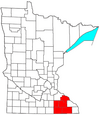Lake City | |
|---|---|
 Historic wing of the Lake City City Hall, built in 1899 | |
| Nickname: "The Birthplace of Waterskiing" | |
| Motto: "What You Need When You Need It" | |
 | |
| Coordinates: 44°26′44″N 92°16′14″W / 44.44556°N 92.27056°W | |
| Country | United States |
| State | Minnesota |
| Counties | Wabasha, Goodhue |
| Area | |
• Total | 4.50 sq mi (11.64 km2) |
| • Land | 4.48 sq mi (11.60 km2) |
| • Water | 0.02 sq mi (0.04 km2) |
| Elevation | 690 ft (210 m) |
| Population (2020) | |
• Total | 5,252 |
| • Density | 1,172.58/sq mi (452.74/km2) |
| Time zone | UTC-6 (Central (CST)) |
| • Summer (DST) | UTC-5 (CDT) |
| ZIP code | 55041 |
| Area code | 651 |
| FIPS code | 27-34172[3] |
| GNIS feature ID | 0646338[2] |
| Website | ci |

Lake City is a city in Goodhue and Wabasha counties in the U.S. state of Minnesota. It lies along Lake Pepin, a wide portion of the Mississippi River. The population was 5,252 at the 2020 census. Most of Lake City is located within Wabasha County with only a small portion in Goodhue County. Lake City is part of the Rochester, Minnesota Metropolitan Statistical Area.[4]
History
[edit]This section needs additional citations for verification. (November 2023) |
Lake City is located 65 miles (105 km) southeast of the Twin Cities at the intersection of U.S. Highways 61 and 63 on the Mississippi River at Lake Pepin. Lac de Pleurs (Lake of Tears) was the name given to Lake Pepin by Father Louis Hennepin, who camped on the shore of the lake in 1680. He christened the large body of water Lac de Pleurs after observing his Sioux captors weeping near the lake over the death of a chief's son. The war party of Isanti Sioux had captured Hennepin and his two companions several miles south along the Mississippi and were camping near the lake on their return north to their Sioux villages near present-day Mille Lacs.
The first known settler was Jacob Boody, who arrived in 1853. In the years to follow, several explorers passed through this area. The town was platted in 1855. The waters of Lake Pepin are deep enough to allow for a port, and in 1864 the Lake City town supervisors were given special powers by the State Legislature to create a port market for grain. Soon after, Lake City became noted as a profitable market for grain with the volume of trade in 1866 bringing in a little over a million and a half dollars.
Lake City became incorporated in 1872 and has become widely known for its attractive surroundings and bountiful fishing. The Sea Wing disaster occurred on July 13, 1890 when a strong squall line overturned the excursion vessel Sea Wing on Lake Pepin near Lake City. Over 200 people were aboard the vessel when it was overturned, and as a result 98 people drowned.
Water skiing was invented in Lake City by area resident, Ralph Samuelson, which he first performed in Lake Pepin during the summer of 1922. To commemorate this event, Lake City has adopted the nickname "The Birthplace of Water Skiing" and holds an annual town festival, called Water Ski Days.[5] Water Ski Days typically includes three days of water skiing exhibitions, live music, beer garden, street carnival, sports tournaments, and Grand Parade; it is held annually during the last full-weekend in June. In 2020 Water Ski Days was slated to be held June 26–28 but was cancelled due to COVID-19.[6] The festival that will be held in 2021 would have been the 50th, but will be the 49th because of the cancellation.
Lake City has three properties listed on the National Register of Historic Places: the 1872 James C. and Agnes M. Stout House, the 1899 Lake City City Hall, and the 1910 Williamson–Russell–Rahilly House.[7]
Geography
[edit]According to the United States Census Bureau, the city has a total area of 4.56 square miles (11.81 km2); 4.50 square miles (11.65 km2) is land and 0.06 square miles (0.16 km2) is water.[8] U.S. Highways 61 and 63 are two of the main routes in the community.

Demographics
[edit]| Census | Pop. | Note | %± |
|---|---|---|---|
| 1880 | 2,596 | — | |
| 1890 | 2,128 | −18.0% | |
| 1900 | 2,744 | 28.9% | |
| 1910 | 3,142 | 14.5% | |
| 1920 | 2,846 | −9.4% | |
| 1930 | 3,210 | 12.8% | |
| 1940 | 3,204 | −0.2% | |
| 1950 | 3,457 | 7.9% | |
| 1960 | 3,494 | 1.1% | |
| 1970 | 3,594 | 2.9% | |
| 1980 | 4,505 | 25.3% | |
| 1990 | 4,391 | −2.5% | |
| 2000 | 4,950 | 12.7% | |
| 2010 | 5,063 | 2.3% | |
| 2020 | 5,252 | 3.7% | |
| U.S. Decennial Census | |||
| Census | Pop. | Note | %± |
|---|---|---|---|
| 1880 | 112 | — | |
| U.S. Census for Central Point[9] | |||
2010 census
[edit]As of the census[10] of 2010, there were 5,063 people, 2,238 households, and 1,428 families living in the city. The population density was 1,125.1 inhabitants per square mile (434.4/km2). There were 2,687 housing units at an average density of 597.1 per square mile (230.5/km2). The racial makeup of the city was 99.3% White, 0.5% African American, 0.3% Native American, 0.8% Asian, 0.3% from other races, and 0.7% from two or more races. Hispanic or Latino of any race were 0.2% of the population.
There were 2,238 households, of which 24.4% had children under the age of 18 living with them, 51.3% were married couples living together, 8.3% had a female householder with no husband present, 4.2% had a male householder with no wife present, and 36.2% were non-families. 30.6% of all households were made up of individuals, and 15% had someone living alone who was 65 years of age or older. The average household size was 2.20 and the average family size was 2.72.
The median age in the city was 46.2 years. 20.2% of residents were under the age of 18; 6.7% were between the ages of 18 and 24; 21.8% were from 25 to 44; 27.7% were from 45 to 64; and 23.7% were 65 years of age or older. The gender makeup of the city was 48.1% male and 51.9% female.
2000 census
[edit]As of the census[3] of 2000, there were 4,950 people, 2,131 households, and 1,402 families living in the city. The population density was 1,166.9 inhabitants per square mile (450.5/km2). There were 2,347 housing units at an average density of 553.3 per square mile (213.6/km2). The racial makeup of the city was 96.81% White, 0.63% African American, 0.40% Native American, 1.11% Asian, 0.28% from other races, and 0.77% from two or more races. Hispanic or Latino of any race were 2.22% of the population.
There were 2,131 households, out of which 26.7% had children under the age of 18 living with them, 56.0% were married couples living together, 7.4% had a female householder with no husband present, and 34.2% were non-families. 29.2% of all households were made up of individuals, and 14.7% had someone living alone who was 65 years of age or older. The average household size was 2.30 and the average family size was 2.83.
In the city, the population was spread out, with 22.8% under the age of 18, 6.4% from 18 to 24, 26.1% from 25 to 44, 24.8% from 45 to 64, and 19.9% who were 65 years of age or older. The median age was 41 years. For every 100 females, there were 93.1 males. For every 100 females age 18 and over, there were 89.9 males.
The median income for a household in the city was $40,637, and the median income for a family was $47,146. Males had a median income of $35,321 versus $24,799 for females. The per capita income for the city was $20,944. About 3.2% of families and 6.0% of the population were below the poverty line, including 7.7% of those under age 18 and 5.1% of those age 65 or over.
Education
[edit]Lake City is the home of Bluffview Elementary, a K–6 public elementary school, Lincoln High School for grades 7–12 (public), and St. John's Lutheran School, a K–8 Lutheran School of the WELS. Previously, the town also was home to a Catholic School named St. Mary's.
Transportation
[edit]Amtrak’s Empire Builder, which operates between Seattle/Portland and Chicago, passes through the town on BNSF tracks, but makes no stop. The nearest station is located in Red Wing, 17 miles (27 km) to the northwest.
City Services
[edit]Public Safety
[edit]Lake City is Served by Full-time police and ambulance services that are city operated, and a paid on-call fire department serves the city, surrounding rural areas, and waters of Lake Pepin.[11]
Library
[edit]The Lake City Public Library, located at 201 South High Street, is a member of Southeastern Libraries Cooperating, which "provide services and support to public, school, academic, and special libraries in an 11 county region of Southeastern Minnesota."[12]
Media
[edit]Radio
[edit]| FM radio stations | ||||
|---|---|---|---|---|
| Frequency | Call sign | Name | Format | Owner |
| 94.9 | KLCH | Lake Hits 95 | Oldies | Q Media Group, LLC. |
Notable people
[edit]- Randy Breuer, NBA Player
- Fritz Cronin, NFL Player
- Mary Pat Gleason, Actress
- Taylor Heise, Ice Hockey Player
- Lester Alexander Howatt, Businessman and Minnesota State Legislator
- John Kobs, College Coach
- Richard R. Lemke, Farmer and Minnesota State Legislator
- Mark McKenzie, Movie Composer
- Carl S. Nygren, Farmer and Minnesota State Legislator
- Ralph Samuelson, Inventor of Water Skiing
- Dylan Rumley, Michigan St. Football, Division 1 all-american
References
[edit]- ^ "2020 U.S. Gazetteer Files". United States Census Bureau. Retrieved July 24, 2022.
- ^ a b U.S. Geological Survey Geographic Names Information System: Lake City, Minnesota
- ^ a b "U.S. Census website". United States Census Bureau. Retrieved January 31, 2008.
- ^ "Census.gov". Census.gov. Retrieved April 29, 2021.
- ^ "Water Ski Days".
- ^ "Water Ski Days 2020 canceled". Lake City Graphic. April 30, 2020. Retrieved April 29, 2021.
- ^ "Minnesota National Register Properties Database". Minnesota Historical Society. 2009. Retrieved February 11, 2018.
- ^ "US Gazetteer files 2010". United States Census Bureau. Archived from the original on July 2, 2012. Retrieved November 13, 2012.
- ^ "Census of Population and Housing". Census.gov. Retrieved June 28, 2019.
- ^ "U.S. Census website". United States Census Bureau. Retrieved November 13, 2012.
- ^ "City Departments". www.ci.lake-city.mn.us. Retrieved April 29, 2021.
- ^ "Home". SELCO.


